Attack Of The ‘Cast A Woman Doctor’ Critics
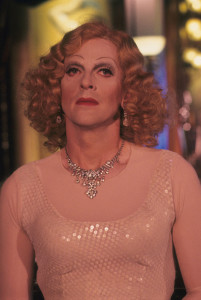
Advance publicity photo of Peter Capaldi in costume as the Twelfth Doctor. (Not really.)(From DigitalSpy.com.)
This is one of the maddest things I have ever seen: Media elites and pundits are upset, truly anguished and heartbroken, that Doctor Who failed to throw away its wild success by stunt-re-casting its 50-year-old titular male hero, the time-traveling alien Doctor, as a woman.1
One example:
Jennifer Finney Boylan, an English professor and self-described “transgender woman,” […] is unhappy that none of the actors who’ve played Doctor Who have been actresses: “Imagine if we were cheering for Helen Mirren instead, or for the comedian Miranda Hart, or for Emma Watson.”2 3
But it’s not fans who moan that Peter Capaldi is “just another white man.” Go to the fan and news sites and you will instead see many comments like this, half of them from female fans:
As a female fan, I can say I am happy that Capaldi has been cast as a male doctor, it is rubbish to suggest that the only fans who didn’t want a female lead are youngies with a crush on [current Doctor Who lead] Matt Smith. I am in my 30s and am quite frankly sick of being told that we have to be so PC about everything. Why don’t we just have a black disabled female doctor and shut the whole lot of the PC brigade up in one go?4
It isn’t sexist to not cast a woman as [T]he [D]octor. In fact, if the only reason you cast a woman is for the sake of casting a woman, the point has been missed. The actor who will best portray [T]he [D]octor’s character should be chosen. The whole character’s dynamics and role would change. I am a woman and I will stop watching if the [D]octor becomes a female. 5
That’s a first reason for not stunt-casting The Doctor as a woman: you can’t flip a fanbase like that. Demographic and marketing figures are used to justify tired tropes and ceaseless sequels, but they are still based on truth: if certain people like a story about a man, there is no reason to recast that hero as a woman, and vice-versa, unless you want to kill the story.
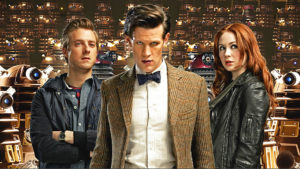
Current Doctor Who lead Matt Smith, with married man Rory Williams and married woman Amy Williams (née Pond).
Reason no. 2: male fans need The Doctor and his unique wit-and-brains-first heroism.
A woman Doctor would be more than a disappointment to the show’s legion of fans — it would betray a British tradition.
The character has been a role model for three generations of boys.
[…]
The essence of the character — as an archetypal hero, not heroine — would be lost.
The Doctor’s strength is that he always wins through by thinking rather than fighting — an antidote to mainstream comic book and action movie heroes Batman, Spiderman, Conan the Barbarian, Tarzan, Rambo and Wolverine.6
A third reason: it’s healthful to have strong male leads whom a story’s male and female fans will want to follow. If you change that, you mess with the — I know this is may be very unpopular — very fabric of natural and fun male/female dynamics of any story and its fans.
Whether from evil sexism or plain humanity, the fact remains: women like stories with men as main heroes — as long as strong women also feature — more often than men like stories with women as main heroes. Both sexes follow strong men. Both sexes enjoy being fans of these stories. And both sexes will also follow gladly after stories that feature strong male and strong female characters. Like The Lord of the Rings. Like the animated series Avatar: The Last Airbender and The Legend of Korra. Even a little like the Avengers superhero films.
And like Doctor Who. Since the program’s revival its stories have featured strong male and female heroes, and weak examples of both sexes (often with redemption journeys, as with Mickey Smith in the first and second series). Now I enjoy the show almost as much for the side characters — men and women — as for the adventures of the Doctor himself.
The PC critic says: “Yeah, and half of those companions only ever crush on the Doctor.”7
Nonsense. That was over with Martha Jones in series 3. Former showrunner Russell T. Davis himself subverted the crush-on-The-Doctor trope in series 4 with my favorite Who companion, funny-bossy-mom/fanlady Donna Noble. Then current runner Steven Moffat finished off the trope in series 5, when Amy Pond threw herself at the Doctor; he refused her, then whisked her off to old Venice with her fiancée. That series and 1.5 more explored their marriage, and the couple’s surprisingly delightful times together with the Doctor.
So that’s reason 4: complaints about the show’s continuing sexism are absurd anyway.
The End(?)
Why then do PC critics insist that “Doctor Who” keeping the Time Lord a man is at best sinful?
That’s a very apt word, I think: sinful. Only in a special mode of thinking are actions sinful:
Religion.
And per the unwritten holy writ of this religion, stories can’t have strong female characters unless they replace male characters. No recognition of strong women unless strong men are first vanquished. No honor given to the feminine without emasculation of the masculine.
It’s completely backwards to take a strong, well-established male character and turn him into a woman just for the sake of feminism or diversity in casting. Instead of changing that strong male into a female, we should just be creating more female and PoC characters who are strong from the get-go (like Clara). 8
That false religion pits sex against sex, and effectively demands an atoning sacrifice for the real or perceived sins of our ancestors. It’s this false religion that we must utterly reject.
And I’m glad Who’s creators have also rejected it — at least for the time being.
- On Tuesday I promised my review of Realm Makers, but I’ll delay that in favor of this topic. ↩
- Great Orator Gaffes Again, James Taranto, The Wall Street Journal, Aug. 7, 2013. Taranto links to Diversity and Doctor Who, The New York Times, Aug. 7, 2013. ↩
- For more on the absurdity of wanting any A-list film stars to play The Doctor, male or female, see here on Spec-Faith. ↩
- Comment by “jelleygirl” after Steven Moffat on female ‘Doctor Who’ rumors: “It didn’t feel right”, DigitalSpy.com, Aug. 5, 2013. (All typos repaired.) ↩
- Comment by Victoria C. Vegter after Women don’t want female Doctor – Moffat, 3news.Co.NZ, Aug. 7, 2013. ↩
- Who should be the next Doctor? ANYONE but a woman! …, Christopher Stevens, DailyMail.Co.UK, June 2, 2013. ↩
- Self-described feminist Isa-Lee Wolf debunks that myth in this March 29, 2013 column. ↩
- Comment by Rebecca Borland after Women don’t want female Doctor – Moffat, 3news.Co.NZ, Aug. 7, 2013. ↩
































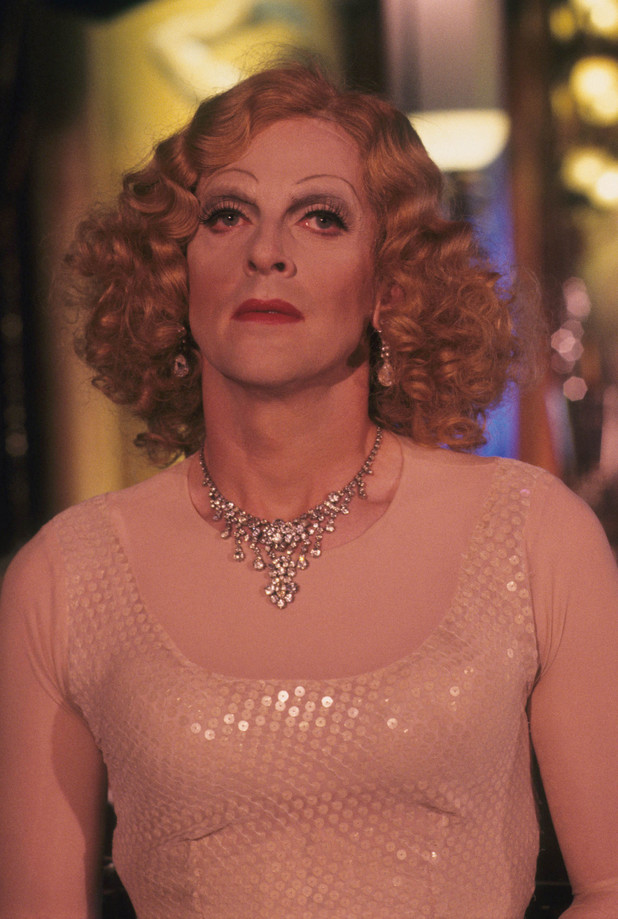
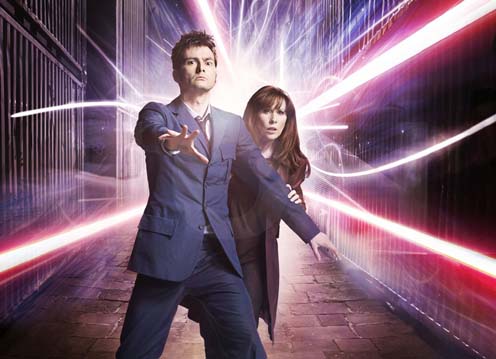
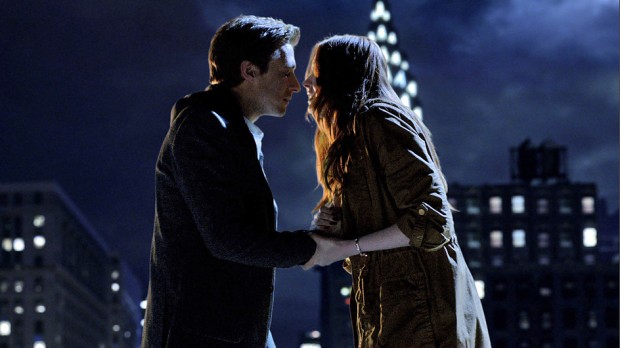









“No recognition of strong women unless strong men are first vanquished. No honor given to the feminine without emasculation of the masculine.”
That is my gripe about this whole argument. There are SO many strong women on Doctor Who–I don’t understand why we have to rid the show of a male Doctor to see that. It’s ridiculous. DW is so far from sexist as-is. The way the stories are structured the female companions really end up being the stars of the show, the ones who *ultimately* save the day. Even the TARDIS is female. I’m so over all this crap about making the Doctor a woman. He’s a man, and HE is awesome, and there is nothing anti-feminist about it.
At the risk of repeating myself, here’s what I had to say on Tumblr in response to saying I didn’t want a female Doctor…
Outside the story, I think it shows a misunderstanding of the show and disrespect to other female characters. Would we want Star Trek with Captain Jane Kirk? Should we have Iron Woman or Nicole Fury? … No, we value those characters as characters, and changing them would be only a gimmick. Likewise, I wouldn’t want Death from Sandman to suddenly be a guy or have Lucy Pevensie replaced by Luke.
Furthermore, it actually de-values the other strong female characters the show has had now and in the past. While many people say the classic companions were “screaming, frightened women,” that’s not the truth. Sure they screamed—but so did the guys, including the Doctor. And they did some pretty impressive stuff. (examples….)
If the Doctor has to be a women to prove that women can be strong/leaders/brave/etc you’re implying that only the Doctor demonstrates those qualities, instead of realizing the characters who already show those abilities.
“It isn’t sexist to not cast a woman as [T]he [D]octor. In fact, if the only reason you cast a woman is for the sake of casting a woman, the point has been missed. The actor who will best portray [T]he [D]octor’s character should be chosen.”
That comment pretty much sums it up for me. I dislike casting according to cultural expectation – I’d rather have the story be a story. Shakespeare was right – when authors are forced to “write what they ought” rather from their heart it usually chokes the story.
If this was what a writer really felt would be amazing and if they had been inspired by an actress that they thought would be a great Doctor (I can think of a couple) then I would have no problem with it. But just to hijack a story because it’s popular and say “we’re going to use this for a political/social reason” is not right.
It just occurred to me that these are the very reasons that much Christian fiction is so constricted. Here Christian sci-fi fans can plead with Grand Moff Moffat and other BBC head honchos: “Don’t do it! We know where it leads!”
It seems like Moffat enjoys playing with us before doing the orthodox thing, as in the Amy-Rory-Doctor plotline. I think while Moffat is in charge we will continue to have a male Doctor – in announcing Twelve he said that if people wanted a female Doctor, “it was about time the Queen was played by a man”.
Yep, agreed. Grand Moff Moffat likes kidding around first, and then flagrantly subverting the subversions. (Spoilers, sweetie.) The same was true with his “hints” that Amy was really pining for The Doctor all along — or that she and Rory would divorce. And by their story’s end, all the usual boring too-cool subversions were themselves subverted: from Rory’s foreshadowing sacrificial deaths to Amy’s feigned extra-marital “crush,” to the expectation that cool couples never stay together, to this couple’s last name.
Great post! I haven’t seen Doctor Who, but it’s a relief the crew hasn’t tried to be politically correct. Nothing against female leads, but I agree with your point that switching the gender of the lead character is unnecessary.
And if there is a female lead in a film, I prefer she actually contribute to the plot with some skill or talent or knowledge. The other day, my sisters and I watched a film called The Dragon Pearl, and later it occurred to me that the lead girl Ling had no skill or talent she used to solve the mystery; she was simply “chosen” by the dragon. She can read Chinese, but that never played in because the kids didn’t need to read the book to enter the ancient tomb (that bit was pretty clever!). But Josh, the other lead, had a talent for noticing and remember patterns, which were crucial to solving the mystery.
And this same problem occurred in the Pat Boone Journey to the Center of the Earth (don’t watch it) and Jack the Giant Killer (though I liked that one). Well, and also the Walden Media Voyage of the Dawn Treader–Lucy was forced to read the magic book rather than making that choice to save her friends. And don’t get me started about Tauriel.
Pardon the mild rant;just thought I’d throw that out there and see what everybody thought. Thanks for posting this article, and I look forward to your Realm Makers post whenever you decide to share it!
Blessings,
Literaturelady
If anyone would like to go to novelmatters.com Sharon Souza posted yesterday about writing the opposite gender. I have shared the link to this post over there. Gender is a hot topic for everyone.
Thank you for stating so clearly the other religion’s mantra.
“No honor given to the feminine without emasculation of the masculine.”
Meanwhile God says, “Don’t kill them, instead accept Abundant life for yourself”
Indeed. And He says,
By the way, it’s vital to translate the word as sons there, and not some genre-vague language (as some are wont to do, trying to pre-gender-clean the Bible). Without the word “sons” and its definitions regarding first-century-era heirs, readers don’t get the vital truth that in Christ both men and women and people of all ethnic groups are treated like first-century male-only heirs!
Two of the points you made are why the “critics” who are mostly political wanted a female Doctor. They wanted to destroy another male character, and they wanted to push political crap, by having a character they could say was “transgendered”. Neither of those are good reasons to change the Doctor.
I will say that the only time I disliked how a female character was handled was with Rose with Nine and (once) with River Song. Nine was too passive and weak for my taste. Excepting the Slitheen and the two-parter with Jack Harkness, Nine did little and Rose saved the day all the time. I thought he should have been more proactive as later Doctors have been. River had the whole parking brake joke which irked me as it suggests every Time Lord ever in the Classic series was inferior to her on TARDIS’s. A joke, but my love for the classic series is such it annoyed me.
WTF? You’re basically taking anything that any woman character does better than the Doctor as a threat to his masculinity, and that’s a load of douchepickle.
For the love of fried potatoes, people, feminism isn’t about emasculating men, unless your definition of emasculation is not having him being superior in 4/5ths of relevant skills, which is more douchepickle. Action is not masculine, and passivity is not feminine, no matter how much the Victorians popularized it.
There are, however, “feminists” who think the only way to lift up women is to knock down men. I think that message gets sent with the idea of making The Doctor female.
One of the things I love about The Doctor — and one reason I want to keep him male! — is that he treats women the way most feminists would want to be treated. With love and respect. He sees women as beautiful and strong, and as important because of their brains and abilities. And he’s strong right beside them.
So yes, I agree that feminism isn’t about emasculating men, and shouldn’t be, which is why I find it sad that so many feminists suddenly think it’s sexist to not take away The Doctor’s maleness and instead applaud the awesome female characters–and there are GOBS of them–already on the show.
I call those “Westboro feminists,” and they have about as much relevance to feminism as the Westboro Baptists have to the majority of Christians.
And you’re coming off as saying, “They threw us these bones, feminists, now STFU and GTFO.” The issue isn’t around the female characters in Doctor Who being awesome, because they unmistakably are, but these arguments against a female Doctor essentially boil down to “the Doctor is too important to be a woman” or “women aren’t capable of being the Doctor,” and that’s a pretty straightforward example of sexist bullsh*t.
I don’t think the Doctor’s character is much dependent on the traditional notions of masculinity. He’s a protector, but women are also protectors. He’s compassionate, and so are women. That’s very often considered “feminine,” though I think that classification is nonsense, too. He’s very Britishly anti-gun and often anti-violence, and most people who put stock in masculinity don’t find that masculine.
Gotta pull a mod move on you here, Leia. The asterisk doesn’t fool anyone. Spec-Faith is open to Bad Language in fiction, but here on the blog we will keep the audience broad and the language more careful.
Apart from that, though, you seem to want to argue with what no one here is saying. I haven’t heard anyone either here on SF or on the other sites to which I linked say anything remotely similar to “the Doctor is too important to be a woman” or “women aren’t capable of being the Doctor.” If someone says that criticism, it would indeed demonstrate misogyny. But I’m not seeing that here. Instead the arguments are more complex.
My problem is not so much that people want the Doctor to stay male so much as the reasons they’re giving why it would be bad if he didn’t. If it’s just a simple liking for the story formula as-is, then fine. I can’t knock that. I feel that, too. But apparently it would threaten masculinity and the people who look up to the Doctor would be…not threatened, but disappointed, less enriched. What else does that imply except that female is not as good as male, even if it’s just in this context?
Pshaw, I don’t feel personally “threatened” in the least. 🙂 I only feel a special and enjoyable story series threatened by well-meant but ultimately silly and politically correct punditry (which won’t even ultimately help fulfill the goals that the punidts say they want).
I’d love to know where these folks are, because (as with any gender issue) I’m sure they’re there. I simply haven’t seen them as you have.
You’ve totally misread me, but that’s fine. I’m not arguing this. The Doctor is awesome. Love him as-is. I find him plenty masculine even without guns and violence. Love the female characters (and find them very feminine even with guns and violence). Don’t at all feel I’ve been “thrown bones” as a *female* and *feminist*.
Yep. And I see a lot of that behind much of the “Doctor Who” criticism here.
But anyway, if we believe in Story First, then all this socio-political and gender-war stuff doesn’t even belong in the discussion. Suddenly we’ve stopped acting like a story has value in itself, and are acting like a story only has value if it’s a Vehicle for some other socio-political cause. Not good.
Yes. I don’t think anyone is arguing that only white guys can be heroes. I think what we’re saying is that this particular story has been told for nigh on 50 years with a male protagonist, so why turn it upside down for no good reason than a casting stunt? Because that’s all it would be. A female Doctor would not be a great achievement in the history of feminism. It would be a cheap publicity stunt. And great art is not about stunts.
Yes, I just called Doctor Who great art. 🙂
With all due respect, watch your flipping mouth. Referring to a woman’s gynecological stuff is far worse and much more vulgar, than any swear words. Use the f-word, it would be less vulgar.
Secondly, I never said I didn’t want a woman who could compete and be powerful. I said it shouldn’t come at the expense of the male hero, out of some desire to replace him. Feminism, as originally visioned with about equality. Replacement of men or disrespecting them is more misandry than anything else. Also, the hero or (depending on the franchises) should not be overshadowed by the supporting cast. Lois should never overshadow Clark, Steve Trevor should never overshadow Wonder Woman, so forth. They can be awesome, but in the end, Supes and Wondy should ALWAYS save the day far more often than Lois and Steve.
Finally, to emphasize, since I have a horrible habit of thinking faster than I write and thus being unclear, River I actually liked. I just didn’t like the continuity of the Classic series I grew up with trashed just for a stupid joke or to make a contemporary character, Doctor or companion, look good.
Meant to say the hero (or depending on the franchise) the heroine should not be overshadowed by the supporting cast. I didn’t edit that before posting.
I find it very telling that you find a reference to female genitalia dirtier and more disgusting than an f-bomb, but fine.
If your main character’s awesomeness is dependent on no one else’s being as awesome, you probably don’t have that good of a character. Also, Han is cooler than Luke, but people still like Star Wars.
And what’s to keep the Doctor from being as awesome as he already is if he’s a woman? I talked some in my above reply to kat about how I don’t think the Doctor’s character is dependent on masculinity.
Well yes. I would also think it disgusting if someone talked about the male genitalia. I’m going to assume you don’t want me to discuss that, and if you do, please go elsewhere. Though I will admit that is a case of sexism with most people, not me. I consider the pejoratives with male sex organs equally vulgar, and others don’t. So they are sexist and wrong, flat-out.
Han is cooler than Luke is subjective and the fan verdict. It was not the way Lucas, et al, purposely wrote the films, as weakening Nine was how they wrote him. Nine was weak, whereas none of Han’s percieved “coolness” over Luke took away from, or was due to, them making Luke passive and helpless. Whiny at first, absolutely, passive, no. And none of it took away from Luke’s accomplishment. Amy saved the day at times over Eleven, and Rose or Martha over Ten at times, as well, but that didn’t change the fact that the Doctor was the hero. Rory, Amy, and River got in some good stuff in the two-parter ending season five, but it didn’t take away from his accomplishments.
Your argument makes no sense since in any story one character will be the main hero and others the supporting characters. Sometimes that is variable depending on the situation, due to the writers making it so. It is a common convention. Look at the characters in the Justice League, for instance. Often, Batman is made more capable to an extent than in his comics, whereas the Green Lanterns of earth when they show up are made weaker than in their own books. That is to make the team dynamic work. If you think that is making the character not worth it, fine, but it is a common convention that has served DC and other writing teams many times.
It’s a preference for me. I disliked the Fifth Doctor for some of the same reasons, though to your point, I will admit not liking the sixth Doctor for being an arrogant, and somewhat abusive jerk.
It just depends on what you want the Doctor to be. I want him as a hero, as opposed to an observer who is saved. Now if you want him to be a character who barely wins at all really himself and only the stimulus of the storyline, then so be it. But don’t pretend he is the hero. I prefer my heroes to be, well, heroic. I had no problem with Rose in Ten’s time as she and the Doctor were both awesome, but with Nine, he was mostly very weak and passive.
I also found Martha more likely to buy as being a proactive hero, as she is intelligent, athletic, and overall a very accomplished woman. Rose was no where near so in her personal life, and the supplementary materials from the web site at the time made her seem ditzy to me, so I had a harder time buying it. Then again, such details are of questionable canonicity, so make of that what you will.
Your argument about making a character one way story-wise to not take away from the hero makes no sense to me, rather, given what I pointed out. I’m sorry, but I need to edit and forget to do so.
Granted, the usual storytelling logic is that the person who does the most, and also the most important, is the main character, so the easy way of doing that is to have the main character do the most of the most important things. But I question the assumption that to build a team, someone has to be elevated to lead while everyone else has to be diminished.
Take “The Avengers.” Captain America is in charge, but no one is really diminished because of it. However, that’s probably because there isn’t really a main character because most of the characters were mains in their own movies. But “The Avengers” didn’t suffer for it.
So I guess the next question to ask is whether one specific hero is necessary, whether it makes a story stronger, or just more simplified.
And if we considered the companions as co-heroes to the Doctor…? It works. Maybe not perfectly, but it has legs. They have their own moments or episodes where they do more of the heroic stuff, the Doctor acting more like mentor or traditional deus-ex-machina, like Odin disguised in mantle to give advice.
Like the Blink episode. Most of the Doctor’s limited screen time is by means of DVD, so it’s up to Sally Sparrow to find and use the knowledge and tools Ten leaves for her. It was a good episode.
My anti-misogyny cred is fairly well established, so I feel quite free to ask this: is it even theoretically possible to spy misogyny where it isn’t meant?
I ask not to denigrate the sin of misogyny or chauvinism. Far from it.
But if everything is misogynistic — even objection to vulgarities inspired by unique and sacred attributes of both genders — then nothing is.
Oddly enough, just as I was typing this, right next to me my wife and sister-in-law were examining an illustration of a time lady regenerating and making pretty unicorn shapes with their time energy. And my wife remarks, “That is why girls shouldn’t be Doctors.” 😀
I think, however, that things like this seem anti-feministic not because of intention, but because of previously established stigmas. In that case, I use my “Harry Potter” argument based in Mark 7 and Romans 14: it’s not a particular Thing that’s sinful, but how it’s used, that puts sin — from human hearts — into action. This is why I don’t even mind stupid “back to the kitchen woman” jokes. The more freedom you have from misogyny, the more free you are to laugh at it, and not fear or misjudge what seem expressions of it — even while knowing it’s a serious sin.
The same, by the way, goes for extreme feminism. Both are unique evils.
In hindsight, implying he was sexually repressed would have been more accurate, since he presumably finds all genitals disgusting. *passive-aggressive smiley*
But the whole of misogyny does not lie in “get back to the kitchen” jokes. The ideology behind it is more pervasive and subtler. Like assigning unicorn-shaped time-shinies to the female Time Lords, because it’s “girly,” or conversely, laughing at the idea of the Doctor having unicorn time-shinies because it’s undignified because it’s girly.
Then there’s what we label as feminine or masculine. Unicorns are feminine, or effeminate. Fire-glowy-whatever is masculine and therefore dignified enough for a Doctor regeneration. Determination is masculine. Action is masculine. Passivity/inaction is feminine. Rescuing is masculine. Being rescued is feminine. The Doctor being rescued is effeminate and unworthy of his heroic role, because heroes shouldn’t/can’t be feminine.
The previous waves of feminism have convinced people that women have value, but most of the values were/are considered masculine. Or that what is masculine is the stuff that’s considered valuable. People can accept “masculine” women — at this point they’re not even considered very masculine, but effeminate men are still unacceptable.
Most of you probably don’t believe this, but these are attitudes that exist/ed and act as background radiation to our culture. It shouldn’t be ignored.
This is fine in theory, but it doesn’t work in real life. I used to argue exactly like you did on the inability for men to be feminine, but it just won’t work. It’s too long to go into here though.
You are into anime, so look up the “soushoku danshii.” Grass-eating men. You’d be surprised how many women dislike men when they do act passive, are prone to inaction, or are effeminate.
I’ve often thought this was strange.
And you can look at it two ways – it’s unfair on women, because it implies women are inferior to men. But it’s unfair on men, as it’s implied they’re not ‘real men’ unless they follow some kind of stereotype. As women we have more freedom to be who we are, I think.
dmdutcher, look up “bishounen.” They’re dudes whose appeal is largely in their femininity. Aesthetic femininity, that is, they’re usually active characters. But active characters should be framed as “awesome people,” not “manly,” because as I said before, action/passivity is not masculine/feminine.
Leia, mod note: thanks for cleaning it up.
Yet your assertion that someone who dislikes or condemns use of vulgar profanity is thus repressed, sexually or otherwise, is absurd and also cliche. It’s a rather foolish view that equates sexual freedom only with particular expressions of vulgarities — a notion that comes right back around and approaches repression. “Oh, your freedom doesn’t look exactly like mine? Then you must be repressed, and I shall mock you for that.” A bit intolerant, this!
As we’re Speculative Faith, it might be worth it to bring the conversation into the faith side of it. Which Scriptures relate to the differences and similarities between men and women? (I gave one above from Galatians.) This is also dangerous, of course, but not nearly so dangerous as trying to be moralistic about gender relationss and solutions, with morals based on mere opinions!
Bishonen’s appeal is skin deep though, and most are very masculine when they aren’t being used as a stand-in for the female reader or a hook to draw them in, i.e. “Bishonen Jump Syndrome.” They are more about possessing a certain body type than the workings of the mind; many bishonen are often hyper-masculine and even cruel, like the megane-glasses guys.
dmdutcher, again, ehh, not all bishounen. I’ve run across some bishounen who also have mannerisms that are considered feminine in Japan. Take Fai from “Tsubasa Chronicles.” He’s the very bishie, smiley, cheerful, lighthearted one who gives everyone kawaii nicknames, especially Kurogane. In fact, Fai and Kurogane make a good compare/contrast for bishounen vs a more traditional Japanese masculinity.
But anime aside, I don’t know if there’s much point in trying to come up with the conclusive list of what women like in men or vice versa. There’s a lot of idiosyncrasy in the mix with stuff that reaches across genders like sympathy and confidence and respect.
And to Burnett (this thread is getting messy, isn’t it). What, you think I’m serious about his being sexually repressed? I’m not, if that makes you feel better.
But now I have to guess at what you mean by referring back to scripture. The Bible doesn’t really have much to say about genders or their differences or similarities. I think it’s a good guess that your views fall in line with complementarianism and gender essentialism, so I’m going to outsource my reply to someone who has already done an admirable job of dissecting the ideas, though within the frame of the Christian conservatism she’s familiar with, which is Independent Fundamental Baptist.
http://defeatingthedragons.wordpress.com/2013/06/14/complementarianism-and-the-genesis-fall/
and
http://defeatingthedragons.wordpress.com/2013/02/04/saturation/
Good to know it was just a joke — hard to know on the ‘net though.
“The Bible doesn’t really have much to say about genders or their differences or similarities.”
Not nearly as much as some act, and more than others act.
It touches more on the differences between men and women in their marriages, which some wrongly conflate with differences in genders across the board. Really, I more often climb all over what’s marketed as “complementarianism” more than I agree with it. (Groups such as Vision Forum offer the worst.)
Again I would ask: Is it even theoretically possible to spy misogyny where it isn’t meant?
I’ve asked this about other hot-button gender issues, e.g., extreme feminism. It’s definitely possible to spy misandry where it isn’t meant (evangelicals do this all the time). A turnabout is fair.
As for the links, I’ve fairly well researched the issue, mainly from trying to see what Scripture says first about Christ and His Church, and then seeing how Scripture compares a Biblical marriage to that relationship — mainly in Ephesians 5 — and not trying to force the metaphor to mean what it doesn’t mean. For example, Vision Forum likes to translate the application from wives to all women (an absurdity at best), and others decide that if the husband is like Christ, then that effectively makes him the family’s high priest, which is utter nonsense and could even lead to heresy.
But again, the main topic here — to avoid the messiness you had mentioned! — is whether it’s necessary to critique “Doctor Who’s” makers of misogyny or whether it’s even theoretically possible to overreact. I also see nothing wrong with Things like discerning “feminine” or “masculine” cultural traits. It’s the abuse of the Thing, not the thing itself, that leads to sin. And trying to condemn the Thing (e.g. the at-best-silly idea that “guys can’t wear pink!) for the sin leads not to heart changes, but new-fundamentalist legalism.
I’ll be off and off during this week, by the way, due to limited internet.
Burnett, theoretically it’s possible that people could see misogyny where it’s not meant, but as this comments section shows, people can mean to be not-misogynistic and still say misogynistic things (though I can only guess that they don’t mean to be misogynistic). I can’t answer for all feminists, but my beef is with those people who have misogynistic reasons for wanting the Doctor to stay male, not that the BBC corporation is trying to keep its audience happy and buying their stuff. To rephrase, I don’t consider the Doctor being male to be misogynistic, but who I do think are misogynistic are the people who say things like having a female Doctor over a male companion “diminishes” the male character.
And it looks like we’re going to disagree over whether culturally-defined “feminine” and “masculine” things are stupid/harmful/etc, and there’s not really the space to duke it out. That’s a more parenthetical issue, anyway, to what’s at hand.
I’m not sure how that would work. It sounds like you’re saying that someone may not intend to say something wrong (which I appreciate), but that regardless of their intent, it’s wrong anyway. Who defines the “wrong” here? It sounds like the answer is, well, you. But by this standard I could also accuse someone of saying something misandric only according to my own interpretation. I’d rather ask someone’s meaning and presume they don’t mean to be Bad (as you seem to be doing, and again, my thanks!), but also not ascribe Sin to words. It’s the use, not the Thing, that results in sin.
True. Just note, however, that I’m trying to practice a consistent Biblical approach to the whole thing. Scripture does not say that it’s sinful to believe that society benefits from husbands working outside the home and wives working inside the home, any more than it says it’s sinful for wives to run their own businesses or for little boys to enjoy playing with dolls. It’s not the what that makes sin, but the how and one’s motivation from the heart. And of course, anything that isn’t motivated by faith in Christ and the Gospel (Romans 14:23) ends up being sin anyway. Only in His death and resurrection can any person hope to practice God-glorifying deeds.
But ultimately …
… We’re agreed. Other skillfully told stories manage to have male characters as sidekicks to female heroes (such as The Legend of Korra animated series), without “diminishing” the males at all.
I don’t think it could work, mostly because the Doctor’s mannerisms as a male couldn’t translate as well to a female. The Doctor’s a bit of a manic pixie dream girl, and in a way, that works because he is male and against the usual type. If it was a woman Doctor, she’d risk playing the trope straight, or would have to be a similar inversion for women.
To use another example, to me it’s always been evident that the Doctor is a wizard dressed up in atheist garb. You can call a wizard a time lord and a magic wand a sonic screwdriver, but it’s all the same in practice. But a female doctor would be a witch, and the related tropes would be a lot different.
I find this very odd. Has the feminist lobby proposed the same thing for James Bond? I wonder how many 007 fans would stick with the franchise if HE became a woman! 😕
Becky
It couldn’t be worse than Skyfall. Actually, a female Bond in that movie would have made a lot more sense, now that I think of it.
Yes. They considered replacing Pierce Brosnan with Catherine Zeta Jones.
“The name is — Bond. Jamie — Bond.”
Someone had to say it.
But even that is not nearly so good/bad as this: a cyber-friend who remarked that if the PC suggestions had gone through, the show’s name would need to be changed to Nurse Who.
Oh, that’s so wrong…
Um. No. A Doctor and a Nurse are entirely different. There are male nurses and female doctors – and I dare you to try calling a female physician “nurse.” Go ahead. Try it.
🙂 That’s why my friend made the joke, whereas I resisted. Sort of.
Misogyny (as well as
feminismmisandry) are both serious sins, but surely we can have a little fun with both. If anything we are laughing at ourselves for such absurd societal notions such as that only men can be medical professionals.I think you meant to say that misogyny and misandry are both sins. Simple feminism is the belief that women deserve equal standing with men. Given what you’ve said before, I don’t think you meant to say the desire for equality is a sin.
Indeed, thanks for your charity. Correction appended above.
I do dislike the term “feminism,” but only because of its modern sense, which often stands for little more than misandry and rejection of any God-created differences between the sexes. (Which do not, by the way, including the women-stay-at-home-only nonsense that many Christians do equate with “differences between the sexes.) I also dislike what “chauvinism” stands for, though to many it seems equivalent with “chivalry”! Perhaps the term “equality” is better than even “feminism.”
‘Humanism’ would be a good word if it didn’t mean something else!
Much of the discussion has centered around the “female fans crush on The Doctor” angle. But what I see is that The Doctor really occupies a paternal sort of role. He’s not only a father figure to the companions, but to everyone. (Although in the William Hartnell days, it was more like grandfatherly figure.)
Turning that into a maternal figure might be an interesting experiment, but it would still amount to stunt casting and would upend the show’s dynamic. Not worth it.
The Doctor is the ultimate father-protector. He doesn’t only protect his literal descendents (Susan) but also his adoptive ones (every companion since). In fact, he tries his best to save every sentient being he ever encounters anywhere. Even Daleks. Even the Master.
Maybe I’m projecting my own faith onto the show in a way its creators never intended, but to me The Doctor seems to be a reflection of The Father.
Interesting. I know a lot of people like to ship the Doctor with companions, but I prefer the fatherly relationship myself. In fact, Anglophenia (BBCA official blog) commented that Eleven’s farewell to Amy in “The Big Bang.” “very much resembles the last words of a dying parent.”
I see a similar dynamic with Clara. Also, (especially with 11), what’s one of his defining characteristics? “Can’t stand to watch children cry.” And you see him with Mandy (Beast Below), George (Night Terrrors), Merry (Rings of Akhaten), and he’s just so good with them…
Yep. That’s what I’m talking about. 🙂
I read this article and these comments and thought, “This is why feminism still needs to happen.”
One huge problem that I find with this article’s stance is that implication that male role models are better than female role models, with the sub-implication that boys can’t appreciate (or have nothing to appreciate in) female role models.
Seriously, we ask girls/women to identify with male main leads all the time, why aren’t boys/men capable of identifying with female main leads? (Same thing with race. Everybody is expected to relate to the white main characters, but why would making them any other race make it impossible to take them seriously as main characters?) Ye gods and little fishes, “Avatar” made us relate to blue cat-people, though even then the lead still had to be a white dude, albeit in a blue-cat-person body 3/4ths of the time.
It’s not about cramming every minority under the sun into a show/movie/book/whatevs. It’s about ridding the world of the nonsense (albeit mostly in implication and subconsciousness) that white dudes have the monopoly on significance in this universe. It’s about the possibility of having a female actor play the Doctor without having people question her validity, especially when they didn’t question the validity of a 20-something actor playing a 1000+-year-old character, or the 1000+-year-old character often being ditzy.
Not only can I appreciate an excellent female character, but I can and have identified and felt empathy with female characters. There were moments when I could feel myself in the shoes of Kira Nerys from Deep Space Nine, as a religious person trying to fit in among people who don’t understand faith. I really connected with the self-loathing of Starbuck in the newer Battlestar Galactica. (Interestingly, Starbuck is a character who was gender-flipped; the character was male in the original Galactica. However, even I know enough about Doctor Who to see that this is a completely different situation; it’s not a reboot at all.) But the female character that I’ve empathized most with may be the homeschooled protagonist of the interactive fiction story Bee by Emily Short.
In an ideal society without sexism or the need for reactionary movements like feminism, it shouldn’t be weird at all that as a male, I can identify with female fictional characters. Gender is an important element of who we are; it is absolutely wrong to deny that. But gender isn’t our only defining characteristic, and I think gender is more or less irrelevant to the human condition. That’s why boys should be able to cheer for girls without any implications about sex or prejudice or anything else, and vice versa.
(I think I have a problem with describing these characters as “role models.” Heroic protagonists in television shows don’t model roles that we’re supposed to fill, not literally. The term implies that the purpose of storytelling is ethical education.)
I think we can get along. Have a thumb.
This has only to do with the last comment you made. The rest is very high-five worthy. 😉 And this following comment can apply to both male and female heroes. I don’t know what the purpose of story-telling is, but I do think that there is some notion that our heroes should have values and ideas we can emulate, not in a specific religious or political sense, but in a broad moral sense. I know he might be popular, but no one calls The Punisher (for an example off the top of my head) a hero, he is an anti-hero at best, maybe a “token evil team mate” type. Heroes should have good qualities that we can look up to, to some extent. Otherwise they are villains.
Yeah, you’re right. I was just reacting to the connotation of elementary education that the phrase “role model” brings to my mind, for some reason.
My friend, no one said anything about only white dudes can be heroes. We are saying (at least I am saying) that to change the current character that dramatically should have a good reason, from a story point of view. Politics is not a good reason, and neither is social activism. The only folks making mish-mash of this are the social activists who want to change a character so they can make some idiot statement about gender or sexual identity.
I’m sorry but that is a stupid reason to do something. I repeat again, feminism is equality, meaning men and women being equal. To tear one down or have any idea of disdain for the male character or men in general, is misandry. Misandry and feminism are not the same, or shouldn’t be. I find misogny and misandry to be evils, but I am amazed that some folks think that to be misandrist is somehow morally better than to be misognynist. To trash one person, group, idea, so forth, out of the idea that we will give some other group a “chance” is mind-numbing to me. That’s nothing more than saying that evil is good as long as the group being hurt is the group that deserves it somehow, which is morally indefensible.
Hang on a bit…
I just realized we are all arguing about someone else’s creative decision.
Fans will always complain about shows doing stuff they don’t like. But this has gone beyond complaints about how insipid that Rose character is. People are elevating this business with Capaldi to the level of a social affront.
To treat a casting decision in a TV show as if it were an offense against society is just silly.
And when did casting decisions become subject to popular opinion? A guy makes a hiring decision and suddenly his art is derided because he failed to use it as a platform for promoting a social agenda.
But I believe that if Moffat had cast a woman in the role, his art would be derided because he used it as a platform for promoting a social agenda.
If Moffat had cast someone else — say, Della Reese — in the role, I would be disappointed, because the dynamic of the show would be changed rather drastically. But could I call it wrong?
What is the correct response when an artist you admire makes a decision you disagree with? It’s a creative decision. There’s no right or wrong here.
There are plenty of examples of misogyny in art and popular culture. Casting a male actor in a role traditionally played by male actors isn’t one of them.
Moffat and Capaldi and the rest of the Doctor Who team deserve to be given their creative space without everyone and his brother whinging about their decisions.
I really don’t see how regenerating the doctor into a woman would negatively effect the character. IMHO, it would have been amazing to see what someone like Helen Mirren or Emma Watson could have brought to the crazy time lord persona.
(Disclaimer: thus far I have only watched random episodes and scenes from the classic Doctor Who series)
That said, I don’t think it makes a big difference either way to issues of gender equality.
And it is much much more tragic that the poor doctor still isn’t a ginger. 🙁
You’d have a problem with male companions I think. A good example is Peeta in the Hunger Games; what happens is that with a female lead, male secondary characters get diminished tremendously. The male cannot be seen as more competent than the female without robbing the main character of power, where instead a female character seems to work very well in a supporting role even if she upstages the male lead at times. Another example would be Batou, Major Kusanagi’s male second in command in Ghost in the Shell.
This comic: http://www.malaakonline.com/
has a female superhero with a male secondary character. He doesn’t upstage her, but neither is he passive and weak. According the the author:
I disagree. I think it’s not only possible but desirable to have side-by-side protagonists who are strong in different ways. Leia and Han. Mulan and Shang. Lessa and F’lar. The Doctor and River.
Agreed.
Other great examples of strong male and female heroes are from the Avatar: The Last Airbender series, and its sequel series, The Legend of Korra. Both feature strong duos, trios, and teams of both male and female heroes, such as Aang, Sokka, and Katara; and Korra, Mako, and Bolin. I especially love how Sokka’s and Katara’s father is presented in the first series: he’s away at war, but not at all distant, and a loving, courageous warrior.
It’s weakness, not strength, that doesn’t want to add strong female characters beside female characters, or vice-versa — much less demands that strong male characters be changed into females just ’cause Sexism.
As I’ve said, this approaches a religious crusade rather than story creativity. It reminds me of evangelicals who want the “Christian equivalent” of a franchise, rather than creating their own. Political correctness is bad enough — and counterproductive to its own goals — without trying such a parasitic approach.
Yes! Parasitic is a great term for this phenomenon. Why put pressure on someone else to change his art? The critics’ energy would be better spent on creating their own art.
The problem with this is that Peeta is the real hero of The Hunger Games. And you’re forgetting Gale. Peeta is one of the best male characters to come along in a long time – he was the “realest” kind of strong, not just muscular and beefy like his counterpart Gale. Katniss was a central character, but these two represented two sides of her – and did it really well. I didn’t think either character was diminished. Peeta came off looking much better than Katniss most of the time!
Nobody would be complaining about not casting a woman if the writers hadn’t already thrown a bone out there by saying that a Time Lord could switch genders during a regeneration.
While I am happy to have the Doctor stay male, my story instincts say that you could have some fun with having a female regeneration. Given how short Matt Smith’s time was (or seemed to me) as the Doctor, it’s not like it has to be permanent.
Nonetheless, I’m content to leave the female Doctors for the fan fiction universe. Might even write one myself. And let me just say — she’d be ginger. *wink*
(Although how anyone could top River Song as an over-the-top, fantastically energetic, intelligent, wacky and utterly smashing female character on that show, I don’t know!)
Sorry to stir this back up, but must address something, Stephen. Avatar doesn’t make a good contrast because the Avatar can, in fact, switch genders and does so every few generations. The only distinction is that the avatar spirit is neither male nor female and simply enters either a male or female. Just saying.
Moreover, the toughest character in the first Avatar was Toph (with Suki second, I think, then Mei for her ability to navigate all the crazy people in her life), and I’d probably say her daughter holds the title. Korra upstages the boys all the time (though that has more to do with being the avatar than any sort of gender rivalry). And Toph upstaged everybody.
Anyway: My two cents on the whole female Doctor thing is that while it’s apparently (at least in the new ones) possible, there hasn’t been a good *story* reason for it anymore than there’s been one for any of the random homo/bisexuality they like to throw in there. And whoever said his personality would translate weird as a woman is right; that’s probably the biggest thing. It’d be Captain Janeway all over again, who came off bipolar because they couldn’t seem to decide if she should be the masculine, toughened military woman or a matron given to bursts of emotional breakdowns. I personally made a rule with my shapeshifters that they couldn’t change gender (to avoid all the awkward complications). If DW doesn’t have that rule, then two things rule: story necessity & characterization implications.
Slow clap. Spot-on.
No reason why you can’t have a Doctor-like figure who’s female after all half the population of Galafrey is female.
Sarah Jane may be human, but she certainly showed “doctorish” tendancies. The new brigadier is just as good as her father used to be
And I’d be very happy to see the Doctor’s Daughter or maybe Romana as a lead character in a spinoff.
I just prefer to keep the Doctor we’ve already got.
They’re out of ideas and just going for shock value now. Producers have pulled the same garbage before as their shows limp to the end. If the Doctor is through, then let him go. But for goodness sakes, first, give his penis back.